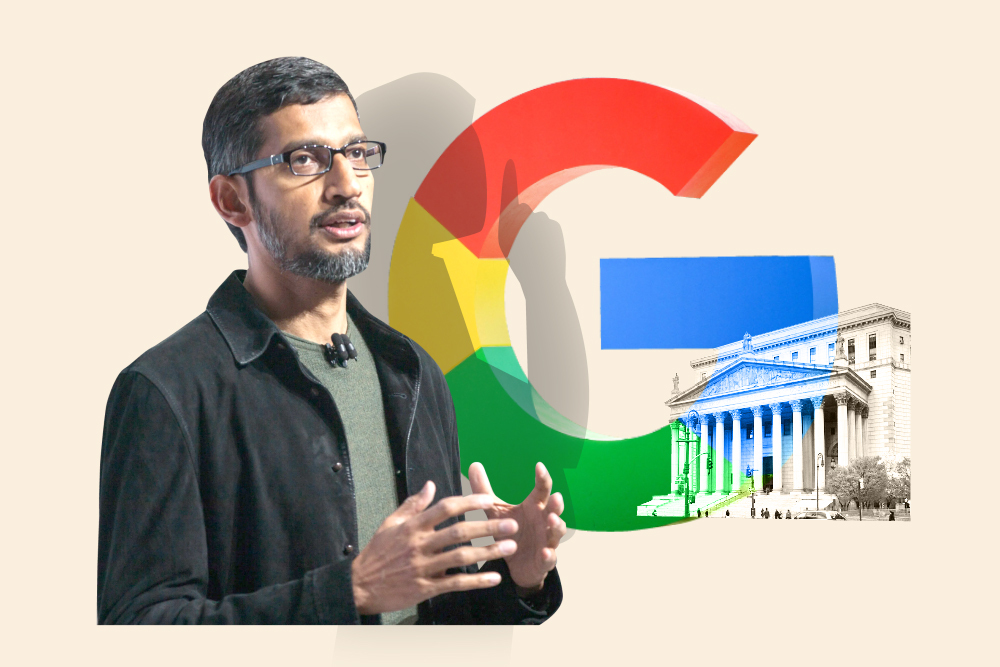Google CEO Sundar Pichai is slated to take the stand in the search giant’s epic antitrust case on Monday — and he’s expected to land on the hot seat for encouraging employees to keep their messages private, sources told On The Money.
Pichai — who will testify in Washington, DC, as the landmark antitrust trial enters its second month — likely will be pushed by the Department of Justice to explain why he has told employees in at least one recorded chat from 2021 to “change the setting of this group to history off,” according to sources close to the proceedings.
The Google boss made the request “immediately” after he and the other employees began “discussing a substantive topic” related to company business, according to a March court filing in separate antitrust litigation filed against Google by plaintiffs including three dozen states, Epic Games and Match Group.
In that same filing, the plaintiffs noted that just nine seconds after Pichai wrote the group that message, he “attempted (unsuccessfully) to delete this incriminating message.”
The filing said the “the newly produced chats reveal a companywide culture of concealment coming from the very top, including CEO Sundar Pichai.”
Court papers haven’t elaborated on what was being discussed in either case.
Outside observers told The Post’s Thomas Barrabi that Monday’s cross-examination could prove to be a major boon to the government’s case.
“That email is a smoking gun, showing an obvious practice at Google’s top ranks to subvert the American justice system,” said Megan Gray, a prominent Google critic and CEO of GrayMatters Law & Policy. “Nothing Mr. Pichai says can change the plain fact that it is a smoking gun. He isn’t some noob making an honest mistake.”
Christine Bartholomew, a professor at University at Buffalo School of Law who specializes in antitrust litigation, described Pichai’s remarks in the chat exchange as a “potential game changer.”
“Courts take spoliation seriously. Destroying evidence is reason to direct a finding against a party,” Bartholomew said. “A CEO directing top executives towards using communication channels that he knows will not be preserved is serious misconduct. I know I’m waiting to hear what possible explanation Pichai could offer.”

While the government has already officially concluded its allotted time to make an argument, sources say the cross-examination of Pichai will be a key part of its case.
“Trial teams have to make careful decisions about how to spend their time, and it was clear Google would call him,” Joel Thayer, principal at Thayer PLLC said, adding that it just made sense for the DOJ to question Pichai then.
The government has noted that after discovery it learned Google automatically destroyed employee messages after 24 hours – erasing what could have been key information for the DOJ’s case.
Indeed, DOJ attorney Ken Dintzer sharply referenced the episode involving Pichai during his opening statement.
“Here is Google’s CEO in 2021, a year after the case was filed. He writes, ‘Need the link for my leader’s circle tomorrow.’ That’s his C-suite team,” Dintzer said.
“Then it shows that he knows how the chat system works,” Dintzer continued. “He writes, ‘Also can we change the setting of this group to be history off?’ Nine seconds later this very smart man realizes he’s left an electronic trail and deletes his request.
“So what did Google do? They destroyed documents for years because they knew their conduct violated the antitrust laws. They turned history off, Your Honor, so that they could rewrite it here in this courtroom.”
Google did not immediately respond to a request for comment.
DOJ did not immediately respond to a request for comment.
In March, US District Judge James Donato, who is presiding over the Epic Games case, slapped Google with sanctions after ruling the company had intentionally destroyed chat logs and “intended to subvert the discovery process.”
Google pushed back on the ruling and said it “produced over three million documents, including thousands of chats” during the legal proceedings.
Source




